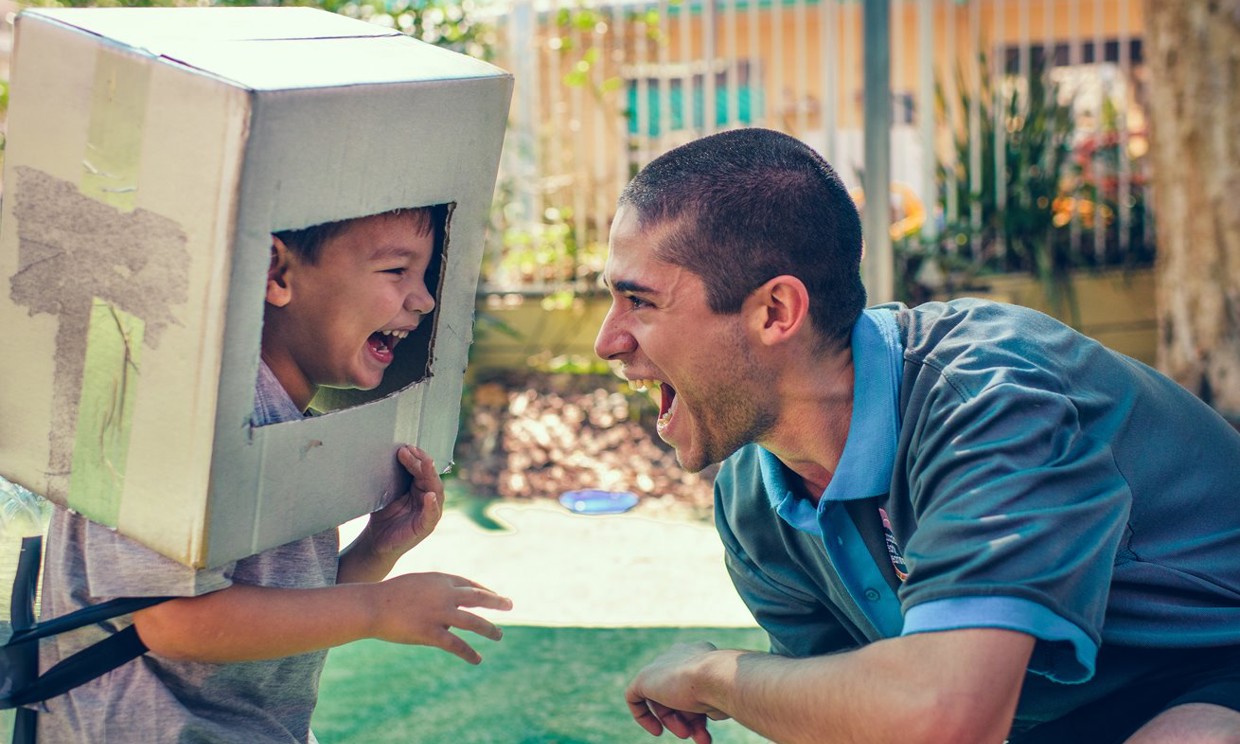Australia has a shortge of male early childhood teachers
It's no surprise that the vast majority of educators in early childhood edcuation and care (ECEC) and are female. There are just 408 male early childhood educators among Goodstart’s workforce of 16,700.
Our figures at Goodstart are similar to those seen in the wider teaching sector across Australia. A team of researchers at Macquaire university tracked the decline of male teachers in Australia over the last 50 years. In this study, McGrath and Van Bergen (2017) confirm our suspicions; that men make up less than 2% of early childhood education and care workers. This is consistent with the national average.
All of this makes Goodstart Tuggerah, a centre with more han just one 'token' male early years educator, an outlier in Australia's ECEC sector. But as their centre director notes, this point of difference has become part of the centre’s success.
'The number of male educators at our centre is well known and is part of the discussion about our centre in the community,' centre director Tearne Martin said.
'We think it’s positive to have both male and female role models in our educational environment, and it benefits the children to see how our early childhood educators communicate and work together. It's also consistent with gender representation outside the our centre. Most families still follow the traditional nuclear family structure with both male and female caregivers, or a variation of it. Children don't go out in the world and see only women doing the bulk of the work and caregiving. In 2024, men are expected to provide more than just financial support and we're proud of how we reflect that reality.'
'Having so many male early childhood educators is obviously a bit different. But families have unanimously embraced the experience. We’ve been over 100% full and have now extended our capacity to 100 students! We also have an exceeding rating in all seven quality areas, so we must be going something right!'
Why men aren't working in early childhood education and care
The success of centres like Goodstart Tuggerah raises the question: Why aren’t there more men working in childcare?
Simone Miller is Goodstart’s Workforce Pathways, Partnerships and Diversity Manager. She confirms the low numbers of male educators we see in Australia are not uncommon.
'Very low male participation in the ECEC workforce is an international phenomenon,' Simone said.
'There are pockets of higher participation in Europe. For example in 2015 Norway had 10% male representation and Denmark 8%, but generally below 5% is the norm.'
'Low pay is a factor, but a significant challenge to greater male participation in childcare are perceived stereotypes about their compatibility with the industry.
'We believe having gender balance is important and that male educators play a valuable role in creating better outcomes for children, so increasing male educator representation is one of the core elements of our workforce diversity strategy.'
Male early childood educators bring a different perspective
The discussion around the role of male educators in early learning is hampered by a lack of research and evidence, but according to a 2007 publication by the National Childcare Accreditation Council (NCAC), a former national body and forerunner to the Australian Children’s Education and Care Quality Authority (ACECQA), male educators can be a valuable resource for childcare services.
According to the NCAC publication, having male childcare professionals in a centre can:
- Encourage children to develop their gender identity
- Promote respectful, harmonious relationships
- Initiate play and learning experiences which acknowledge the similarities and differences between genders
- Challenge stereotypes by promoting alternative images of masculinity which are not aggressive or unemotional
- Encourage fathers to be more involved in the service’s operations, and support the role of fathers as important contributors to children’s lives
- Advocate childcare as a valued and worthwhile career path
- Reinforce that caring is a human response of which both men and women are capable
Anecdotally, Adam Angwin of Goodstart Tuggerah feels most of these perspectives play out in real world settings.
“It’s very positive to break down the stereotypes of what role males can play in raising, caring and educating young children.
We’ve definitely seen more engagement from fathers in the centre, too. We find that they engage more easily with some of the male educators, which means they’re on the journey with us and their child.”
Recruiting more men in early childhood
A 2017 paper published by Dr Kate Liley, Goodstart’s National Research Manager, focusses on Goodstart’s efforts to build a base of evidence to improve the recruitment and retention of male educators.
'We’re learning about what male educators experience in their work and exploring options that better support their recruitment and retention,' Dr Liley said.
'The title of my paper is ‘The men who are here, want to be here’, as what we’ve observed is that men who make a career out of early learning are truly passionate and committed to their profession.
'We hope to be able to provide better advocacy about the beneficial role male educators can play in the lives of children.'
Want to know more about ECEC roles at Goodstart?
If you're a man with early childhood qualificiations and want a career in ECEC, we'd love to hear from you! We also have traineeships if this is something that would work in your favour. Equity and inclusivity is at the heart of who we are and what we do and we believe that men are as capable of being primary caregivers as women. If you'd like to know more about our ECEC roles, go to our careers page and leave your details.


